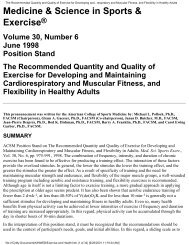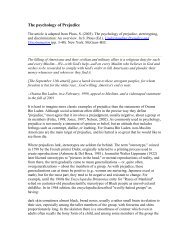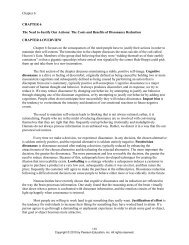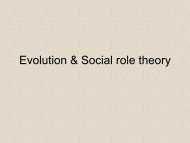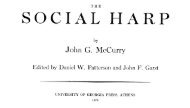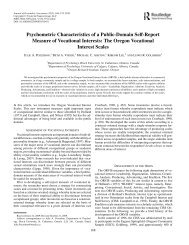Attitudes and Attitude Change CHAPTER 7 Attitudes and Attitude ...
Attitudes and Attitude Change CHAPTER 7 Attitudes and Attitude ...
Attitudes and Attitude Change CHAPTER 7 Attitudes and Attitude ...
Create successful ePaper yourself
Turn your PDF publications into a flip-book with our unique Google optimized e-Paper software.
3. When attitudes change, they rarely do so in response to social influence.<br />
a) True<br />
b) False<br />
188<br />
Copyright © 2010 by Pearson Education, inc. All rights reserved.<br />
<strong><strong>Attitude</strong>s</strong> <strong>and</strong> <strong>Attitude</strong> <strong>Change</strong><br />
4. Counterattitudinal advocacy is a powerful way to change people’s attitudes on a mass scale.<br />
a) True<br />
b) False<br />
5. Which of the following states that people take either a central or a peripheral route to persuasion?<br />
a) elaboration likelihood model<br />
b) Yale <strong>Attitude</strong> <strong>Change</strong> approach<br />
c) heuristic-systematic model of persuasion<br />
d) all of the above<br />
6. Kendra decided to purchase a new perfume because she saw her favorite actress advertising it on<br />
television. Kendra’s decision to purchase the perfume was<br />
a) cognitively based.<br />
b) behaviorally based.<br />
c) made through the peripheral route.<br />
d) made through the central route.<br />
7. April has a good relationship with her parents <strong>and</strong> she respects their opinion. April is out with a<br />
group of friends who all suddenly decide to get tattoos. April’s friends want her to go along <strong>and</strong><br />
get a tattoo as well. Although she has never discussed tattoos with her parents, April suspects that<br />
her parents would not approve of them. According to the theory of planned behavior, is April<br />
likely to get a tattoo?<br />
a) Yes, because of reactance.<br />
b) Yes, because of subjective norms.<br />
c) No, because of perceived behavioral control.<br />
d) No, because of subjective norms.<br />
8. A 2002 meta-analysis of studies that tested the effects of a media message on substance abuse in<br />
youths was encouraging in that kids became more negative toward the use of substances.<br />
a) True<br />
b) False<br />
9. How did Gerald Lambert make mouthwash personally relevant?<br />
a) He said in his advertisement, “All your friends are using it.”<br />
b) He invented a problem, halitosis.<br />
c) He marketed it as a way to prevent throat infections.<br />
d) all of the above<br />
10. Rudman <strong>and</strong> colleagues (2007) found that people whose mother was overweight, <strong>and</strong> were close<br />
to their mothers, had positive implicit attitudes toward overweight people, even if they held<br />
negative explicit attitudes.<br />
a) True<br />
b) False








